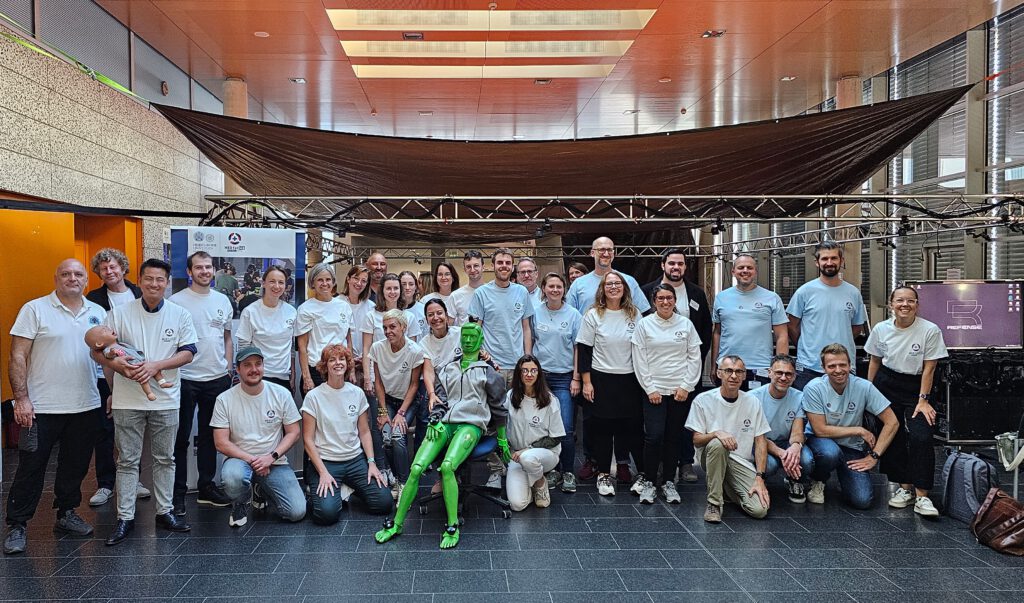The week from September 25th to September 29th was an intensive week for the MED1stMR project.
The 2nd field trial took place in Heidelberg at the facilities of our partner the University Clinic Heidelberg (UKHD). In parallel, on the 26th & 27th September 2023, the MED1stMR consortium gathered together for a General Assembly (GA) at the facilities of our partner Ruprecht-Karls-Universität Heidelberg (UHEI).
We were cordially welcomed on the impressive campus in the beautiful city of Heidelberg and used this opportunity for exciting discussions and further advancements to bundle our efforts for the last project mile.

Insights on the General Assembly
The meeting was very important as it marks the last face-to-face GA meeting and has set the course for our core event, the final conference from the 17th to the 18th April 2024, (see: https://www.med1stmr.eu/meet-us-in-reality/) and the final project outcomes.
Day 1 – 26th September 2023
The first day started with a warm welcome from the Coordinator AIT and the hosting partner UHEI. After an introductory project status update and an overview of the significant achievements and steps forward made since the last GA meeting an update was given on the status of the current field trial running in parallel with the GA meeting, where all major challenges with the setup and preparation have been fixed impressively. An outlook was given on the upcoming field trials with a discussion about any further considerations for the planning of these events.
In the following a brief overview was given on the progress of the GA amendment and about the financial status and aspects to be noted till the end of the project. Our research partner UHEI gave insights in the preliminary results of the XVR study carried out with medical first responders to verify performance indicators for VR training and understanding stress attention as well as a concluding summary on the final WP3 deliverables.
Later that day, an exploitation workshop led by USECON was carried out involving all partners with a focus on the technical development partners presenting their technology plans and how they will combine and complement their efforts for a final MED1stMR solution for commercial exploitation. The workshop started with involving all partners onsite to re-evaluate and rank the advantages of mixed reality training for the definition of the USP for the exploitation of the current solution based on the projected technological development. Subsequently the technological partners presented their business development plans and these and the actual development progress were discussed within the consortium.
The morning session was concluded by a general overview of the achievements in WP4 and a presentation by IDENER of the developed features in the MED1stMR dashboard since the last field trial in Vienna.
After a lunch break, an update on the MR training status, the scenarios and the product backlog was given and new features in the MR system since the field trial in Vienna were presented.
Following a short coffee break the GA participants visited the ongoing field trial at UKHD and met the operators and trainers already participating in the event with the possibility to further observations. A feedback round with insights and analyses of the trainers and a wrap up of the FT experiences concluded the busy program.
The day ended with a joint dinner and a further exchange about the ongoing and upcoming field trials which were the predominant topic of these two days.
Day 2 – 27th September 2023
The second day started with an introductory summary of the achievements and the roadmap for the final project stage. The research partners together with SERMAS gave an overview on the plans and the progress of the field trial studies presenting the objectives, the current status and the preliminary results from the FT in Vienna.
This was followed by a feedback discussion from an end user point of view about the experiences of the current field trial in Heidelberg. What are the actual learnings, which are the improvements that have to be made in the approach and setup for the future FTs and what are the essential remarks and suggestions that have to be integrated in the trainer guidelines for a continuous refinement of the processes and an optimization of the outcomes.
Later, a workshop on the future technology training and education concepts was conducted by our WP7 lead UMU with a lively group discussion structured in technology, research and end user teams providing their initial reflection and recommendations on the developed documents for collecting and compiling the information on this topic and the related deliverables.
Finally, USECON gave an overview of the plans, task allocation and draft program for the final conference, the MED1st highlight event in April 2024. The target group was outlined in detail following a call and proposal for suitable keynote speakers and experts for the panel discussion. The procedure and timeline for the registration, the try-out options and the travel arrangements were presented and discussed with the consortium.
The personal exchanges were vital to ensure that the ambitious project goals will be met and that further progress was made on solutions that would satisfy the entire consortium. With abundant plans for the final project phase, the consortium has left the city of Heidelberg enriched and inspired.
Insights Field Trial
The field trial started with the set-up of the mixed reality training system, some test trials and a train-the-trainer session to get all local trainers on board on Monday. From then on, 4 days of intensive training sessions took place. The combination of training including preparation, training goals discussion, execution and debriefing was accompanied by intensive research activities by our scientific partners. Almost 40 trainees from different organisations trained with the MED1stMR solution triage in 2 different scenarios. The valuable feedback and scientific results will be used to further develop the solution and enhance the upcoming field trials.

